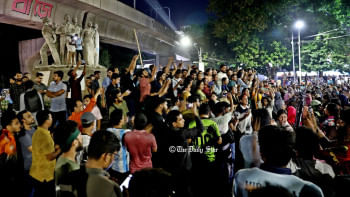Bloodless genocide: The allegorical gaze of Ahmed Sofa

The Third World must start over a new history of man which takes account of not only the occasional prodigious theses maintained by Europe but also its crimes, the most heinous of which have been committed at the heart of very man, the pathological dismembering of his functions and the erosion of his unity, and in the context of the community, the fracture, the stratification and the bloody tensions fed by class, and finally, on the immense scale of humanity, the racial hatred, slavery, exploitation and above all, the bloodless genocide whereby one and a half billion men have been written off.
—Frantz Fanon (2004: 238)
Ahmed Sofa (1943-2001) was already a legend down and out in Dhaka, if not beyond, when he lay dying. He was not well for years before breathing his last. Ahmed Sofa's true legend, however, did not begin with this death on July 28, 2001. As in most other cases of our literature, his legend too began with an encounter with poetry, that universal goddess. He however discovered his true calling before long in language as such, plunging in a mélange of prose and poetry alike, closing in on the heels of Bengali literature's colonial greats, Michael Madhusudhan, Bankimchandra, Rabindranath, Nazrul Islam and a few others who matter.
Perhaps part of the reason Sofa was destined to translate Wolfgang Goethe's Faust, part one, lay in this mélange of poetic ambitions in a prosaic neo-colonial world. But, for all that, he would not abandon that good old poetic craft. On this occasion of Ahmed Sofa's sixteenth death anniversary I propose to provide a very short introduction to the reading of a narrative poem that he wrote in our apocalyptic mid-1970s.
In 1975, Sofa published two slim volumes, in quick succession of one another, namely Jallad Somoi (Time, the Hangman) and Dukkher Diner Doha (Dog Day Songs), the latter containing a longish narrative poem named Basteeujar (Evicting a Slum). He prided himself a good deal on account of this poem. For instance, however ill-matching his key to the master's house might be, Ahmed Sofa once dared a transformation of this poem into a broken English prose, coming quite late in the day, though. The petite bourgeois milieu which he was placed to live in condescended to understand his worth rarely, if ever. I must note, however, that Faizul Latif Chowdhury, a good critic and a leading specialist on the acclaimed poet Jibanananda Das, has paid a no-nonsense tribute to this great poem of Ahmed Sofa's. It seems like finally a wind is blowing. (Chowdhury 2017: 27)
The other or outside in the mothering machine
I should perhaps begin by introducing myself in connection with Ahmed Sofa, who I met for the first time in the summer of 1976. He was then registered as a graduate research student with Dhaka University and living in the northern premises of the University and I, as a fledgling freshman, was just admitted into one of the nearby dorms. At the time he was at work on his doctoral dissertation, under the supervision of the famed Professor Abdur Razzaq, on the growth of a middle class among the Muslims of Bengal (or more aptly, the Bengali Muslims). Ahmed Sofa was not like any other intellectual I knew at that time.
Ever since 1962, when he first moved inside Dhaka, Ahmed Sofa took no leave from the city except perhaps for twice or thrice only, once for a sly break to Brahmanbaria College from where he took his baccalaureate diploma and a second time over to perhaps the Indian states of Tripura and West Bengal as a political refugee in 1971. Ahmed Sofa and Dhaka, thereafter, even in death remained virtually in a deadlock. His remains were finally buried in a common man's ground in Mirpur, in some sort of a slum for the dead, not far from the burial ground officially consecrated for the nation's martyred intellectuals and other stalwarts. Thus, even in his death Ahmed Sofa lives outside in the nation's ceremonial high ground.
Not long away and not far from the space he lived in then, where now stand some of the newer student dormitories of the Dhaka University, a squatter settlement or slum flourished, or so I was told on my first encounter by Ahmed Sofa. It was demolished and its inmates driven out by force one night early in 1975. It was a human disaster but accomplished at the beck of powers that were. Ahmed Sofa happened to be a rare man among our poets who, notwithstanding all its foretold futility, was enraged enough to register his bitter protest. No one else had the guts to raise a riot that day. Ahmed Sofa's Basteeujar has been perhaps the only testimony of a time out of joints. Sofa mourned the loss, but no nostalgia took hold of him. His vision was tinged with a touch of both melancholia and utopia, as I would venture to say today.

As Ahmed Sofa put it once in his perhaps more youthful days, "Writing a poem is sort of a scandal; so I didn't go for one for real long". Perhaps true, founding a city, or better a civilisation, that is to say, the art of living together in towns has been a scandal too. In Gilgamesh, one of the oldest poems we know on earth, we read of how Enkidu, a wild man living in peace with the fauna of the fields and forests, was enticed down from the mountains of south-eastern Anatolia to become a town-dweller in the Mesopotamian plain, by a pretty harlot. As the myth has it, "not unnaturally he fell for her and after seven days of her company he was no longer accepted by the animals he had lived with. He had become civilised." "The myth," according to Gwyn Williams, a concerned scholar, "suggests that towns are a female need, if not invention and that men would not naturally live, work and breed in towns unless trapped to this way of life by the beauty and requirements of woman." (Williams 1967: 48)
For Ahmed Sofa, the name of the harlot is "cruel hunger", the goddess of need, who entices the rural rabble crowding the city. "These rural folks, like ants in queue beyond a count, drawn to honey, crowd the city," writes Ahmed Sofa. His imagery is no less traumatic: "Driven by a pitiless hunger like a man-eating tiger's wrath, like the tyranny of a drought, or a savage flood dragging hillside weeds in its wake," as Ahmed Sofa describes the rural exodus to the sprawling city. It's not much unlike what happens in the world of the classical economists or for that matter in Sir Arthur Lewis's two-sector growth model that divided a neo-colonial economy (a so-called "labour-surplus economy") into two linked sectors: a large traditional sector and a small industrial one. The traditional sector contains a large pool of low-productivity, surplus, labour upon which the industrial sector can draw. But unlike Lewis's model there is no dynamic drive here; the labour-surplus economy would not grow over time, there being no industrialisation providing "the engine of growth".
Lure of the town, in the imaginary of the folks, plays no small role, adds Ahmed Sofa. "These country folks," in our poet's own words, "looked at the city as if it is a fun-filled folk lore come true". The city, in their imaginary is heaven itself; city air frees, or so they believe; it's all illumination per se. In Ahmed Sofa's poetic discourse the peasant turned migrant labourer in the city thinks much like this:
"Flood-light wreaths keep flooding city streets, playful fairies
Crowd around; how merry they keep round the clock,
Afternoons and evenings, adapting to the undulations of
The heart, music oozing out of lyrical movements, and pretty feet!
Steam, air, water and blitz of lightning up in heaven
Serve the town like devoted, ungrudging slaves;
Carts and autos speed along; hydrants jetting water out,
Fresh drafts swishing air out of air-machines,
Happiness itself hangs here like a bunch of grapes."
(Sofa 2008: 532)
An iron rhino or the world turned upside down
Grapes would become sour soon enough, for sure. One fine evening, over mulled wine and cigars, powers that be decided that a whole habitat of hapless rural migrants would be bulldozed in one fell swoop. A rogue never runs out of excuses. Ahmed Sofa had just the misfortune of witnessing the unjust will of that power in action in Nilkhet slums. It was perhaps "Time, the hangman" who was taking over. The world turned upside down that day. It was only Ahmed Sofa who knew that things were more like signs of things to come.
"You can define a majority of Dhaka's denizens as "slum dwellers" right now too, the two city corporations boasting more than two thousand slums, thus vindicating Ahmed Sofa's prognosis forty years down the line, if farther vindication be necessary.
Ahmed Sofa casts a calm, terrible, melancholy look at the scene of mourning. In the end he would end up in an allegory of defiance of the oppressed. All that tyranny needs is a bulldozer and the poet too knows that power comes out of a barrel of a gun. Is it just a narrative motif or is there more to it? Is it a narrative which has a place inside the allegory? Who knows? You are right perhaps. "Evicting a slum" is more than an occasional poem, vintage 1975, for all its oriental despotism. Ahmed Sofa is no doubt witnessing a Dhaka slum, like the couple of thousand others around, fallen prostrate like a dead body sprawling in the mud after three shots in George Orwell's imperial parable. It was perhaps lying there like a non-uniformed peasant's body under the boot of one in uniform.
Read as an allegory, "Evicting a slum" yields a tale of dispossession, of exile, and dispossession again. Looking back, our urban slums appear to be a reprieve, a purgatory of sorts. Doomsday cannot be too far, however. On the eve, "a muffled fear runs aground." As Ahmed Sofa sees it, "a wild rumour jumped like a prairie-fire up and, it seemed, as if some good old hard rock burst asunder in a violent eruption." In the end it is the other's gaze that prevails: "It is as if the ground is sobbing and wailing, frozen so long, now letting its voice find life-giving songs".
At the moment, writes Ahmed Sofa, "pounding hearts were heard beating loud not unlike some trumpets of war." When the bulldozers, those "iron rhinoceros", as Sofa calls them, "blind in rage and anger" finally moved in and began ploughing pretty deep in the ground, those tiny make-believe hovels of the poorest folks felt the crushing weight of power. The other's gaze can hardly skip "skinny naked dirty curious kids bagging a chance to see black eye to black eye those death-dealing gun-barrels". Our melancholy flâneur, not unlike Charles Baudelaire's outsider, is in love with "the clouds … the clouds passing,… up there, … up there, … the marvellous clouds".
Women folk muted like tamed birds
Stood not unlike a still-life painting not knowing
Right when tears in their eyes dried up;
"How could you evade destiny's writ", —the elderly murmured.
Young ones, faces downcast, bore with the agony,
It got so hard, felt like skinning a goat alive.
That slum-dog, man's friend but no fool himself
Got to get barking loud, forgetting to bite the fresh bone in jaw.
(Sofa 2008: 535)
Our narrator meets a bird, shalik, ancient cliché for freedom in a cage, too grief-stricken to sing. A metonymy for home, shimul tree, casts a long shadow. A melancholy, in a word, has taken hold of the world. The poet as flâneur, not a revolutionary, sees "flowers dropping red petals as red tear-drops in anguish"! He sees:
Quilts and pillows bundled up, shutters and window blinds,
Household birds raised in cages, sundry kitchen utensils,
Tubs and bowls, mugs and lanterns, evening kerosene lamps,
Pigeons, stripes all over, flying high,
A disoriented milking goat-mother.
All of man's friends living in agony for mankind.
(Sofa 2008: 532)
A call to arms
Ahmed Sofa ends on a utopian note, reiterating a call for arms. Slums, abode of the disinherited, refuge of the wretched of the earth in fact die hard; on the contrary they multiply as if in vengeance on the city. The pushing rural unemployment, crossed with the lure of urban slums, partly account for this. Man dreams but the mode disavows. "It's impossible," Ahmed Sofa intervened a full quarter century later, "to evict the slums", reiterating what he had to disgorge in his 1975 poem. He found the slum-denizens murmuring: "we are not going to go back to the village, does a baby get back to the mother's womb ever?" They promise, instead, a river of blood, a war on the proud and pitiless towns.
You can define a majority of Dhaka's denizens as "slum dwellers" right now too, the two city corporations boasting more than two thousand slums, thus vindicating Ahmed Sofa's prognosis forty years down the line, if farther vindication be necessary. Dhaka is overpopulated, at the same time they, the people of the city, are overpowered too. In Marxian parlance, "relative overpopulation" is that part of the labour force which exceeds the regulating needs of employment for capital in the given phase of accumulation. Within this one distinguishes a "floating", a "latent" and a "stagnant" sector. To this three are now added new sectors every day, of the unemployed, the underemployed and the semi-employed who together form the unemployed mass of the reserve army of labour.
Ahmed Sofa, known in his lifetime as a firebrand, now appears to be no less memorable for his poems. I do not know yet how posterity is going to read him. But it is all apparent now. Sofa sometimes reminds me of the great French lyric poet Charles Baudelaire who in an apostrophe to his own poems had these to say: "Accursed being to whom from the lowest depths of the highest heavens, nothing but me responds; you who, like a shade that leaves no more than a fleeting trace, tread lightly with a serene gaze, those foolish mortals who called you bitter, statue with jet eyes, great angel with your brow made of bronze." (Baudelaire 1975: 41)
The writer is Professor at General Education Department, ULAB.
References
1. Baudelaire, Charles. "Poem no. XXXIX [untitled]". Oeuvres complètes, tome I, ed. Claude Pichois, Gallimard, 1975, pp. 40-41.
2. Chowdhury, Faizul L. "Jibanananda Daser dirghotom o aprokashito kabita: Someshwar Mustafir prithibe: bhumika". Samakal: Eidsamkhya (Samakal: Eid special number), June 2017, pp. 25-28.
3. Fanon, Franz. The Wretched of the Earth. Translated by Richard Philcox, Grove Press, 2004.
4. Sofa, Ahmed. "Bastee ucched kora smabhob noi, Parts I and 2". Ajker Kagoj, April 14, and 28, 2000.
5. Sofa, Ahmed. "Basteeujar". Ahmed Sofa Rochonaboli. Edited by Nurul Anwar, vol. , Khan Brothers, 2008, pp. 531-536.
6. Sofa, Ahmed. "The Eviction of the Shanty Town Dwellers". Ahmed Sofa Rochonaboli. Edited by Nurul Anwar, vol. , Khan Brothers, 2008, pp. 537-542.
7. Gwyn Williams, Turkey: A traveller's guide and history. Faber and Faber, 1967.










Comments